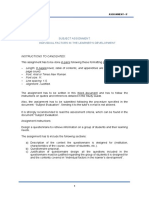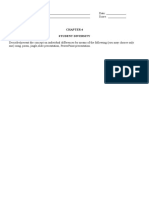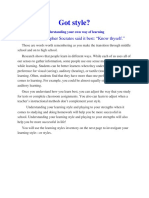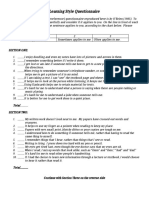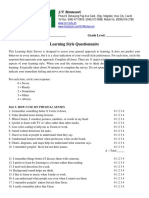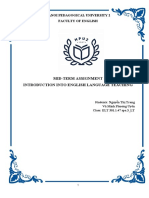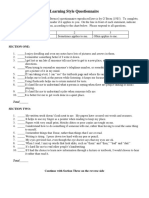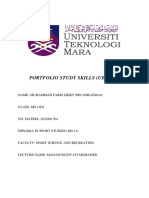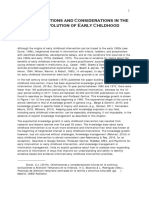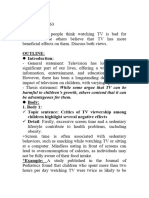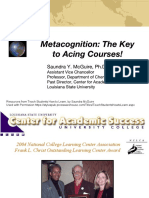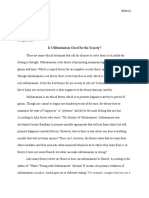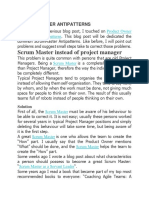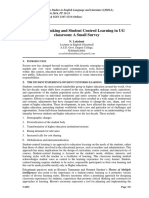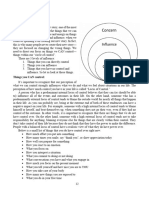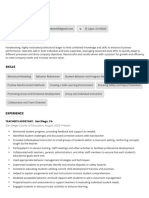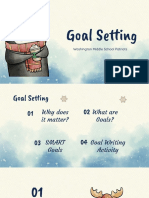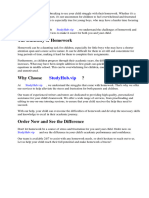SUBJECT AREA METHODS I
IN ENGLISH LANGUAGE
Assignment for 3rd year English Education
(English and Civics minor) students
By
Abdu Mohammed
Faculty of Humanities
Department of English language and literature
Bahir Dar University
April 2020
1
�Note : (1) The first two units of this course will not be dealt with in class.
They are designed for independent reading. Thus, you need to read the
units and make yourself very much familiar with them, and complete the
assignments below. Don’t forget that they will be included in exams.
(2) During your stay at home, read the references given.
I. Assignment on Learning Theories
Read Subject Area Methods I in English Language module (from p. 2-10) and answer
the following questions. Write your answers on your exercise book.
1. Which learning theory do you prefer? Why?
2. Which learning theory is most effective for language learning? Why?
3. Which learning theory was dominant in your personal experience at the different stages
of your education? Give an example in each case.
Stage Behaviorism Cognitivism Constructivism Predominant
Feature/s/and
Examples
Primary school
High school
Preparatory
school
Undergraduate
2
�II. Assignment on Learning Styles
A) The following questions will be answered based on your experience as a learner.
What are your beliefs and opinions about language learning? Below are a number of
general beliefs some people have about learning second (foreign) languages (L 2), as
opposed to learning the mother tongue (L1). Read each statement and decide if you
agree or disagree. Give your own justifications. Write your answers on your
exercise book.
1. The productive skills include speaking and listening, and the receptive skills include
reading and writing. This suggests that the skills are separate and should be treated as
such., i.e. one day students will concentrate on reading and reading only; on the next
day, speaking and speaking only.
2. It has been said by people involved in language teaching that a student who really
wants to learn will succeed whatever circumstances under which he studies.
3. People with high intelligence are good language learners.
4. Motivation is one of the most important factors in learning a second or foreign
language.
5. When speaking or writing, a focus on language forms would be at the expense of
attention to the content of the message.
6. Both complete failure and complete success in language learning may be
demotivating.
7. It is easier for boys than girls to learn English in Ethiopian preparatory school classes
because the boys are not as shy as the girls.
8. While learning a language, children will often seek teacher approval : the fact that the
teacher notices them and shows appreciation for what they are doing is of vital
importance, but this case might not be true for adolescent language learners.
9. English is more difficult to learn for rural children than for town children.
3
�B) Read Subject Area Methods I in English Language module (from p. 12-21) and
answer the following questions. Write your answers on your exercise book.
1. How do you understand learning style?
2. What is the difference between learning style and learning strategy?
3. Do you know your learning style? Are you a visual, auditory, or kinesthetic (tactile)
learner? If you don’t know your learning style, complete the following questionnaire and
identify what type of learner you are.
Read each statement in the following questionnaire carefully. To the right of each
statement, write the number that best describes how each statement applies to you as
follows:
1 : almost never 2 : rarely 3 : sometimes 4 : often
5 : almost always
There are no right answers; respond as quickly as you can to each statement. Once you
have completed all statements, total your scores in the space provided.
Section 1 : Visual
No Statement Score
1 I take lots of notes.
2 When talking to someone else, I find it hard if they do not maintain
good eye contact.
3 I make lists and notes because I remember things better if I write
them down
4 When reading a novel, I pay a lot of attention to passages picturing
the clothing, scenery, setting, etc.
5 I need to write down directions to a new place so that I remember
them.
6 I need to see the person I am talking to in order to keep my attention
focused.
4
�7 When meeting a person for the first time, I notice the style of dress,
visual characteristics, and neatness first.
8 When I am at a wedding, I like to stand back and observe others.
9 When recalling information, I can see it in my mind and remember
where I saw it.
10 If I had to explain a new procedure or technique, I would prefer to
write it out.
11 With free time, I am most likely to read or watch TV.
12 If the principal has a message for me, I prefer it if he sends a note.
Total for Visual (Add up the scores you have written under section 1) _______ (note : the
minimum is 12 and the maximum is 60)
Section 2 : Auditory
N Statements Score
o
1 When I read, I read out loud or move my lips to hear the words in my
head.
2 When talking to someone else, I find it hard with those who do not
talk back to me.
3 I do not take a lot of notes but I still remember what was said.
4 When reading a novel, I pay a lot of attention to passages involving
conversations, talking, speaking, dialogues , etc.
5 I like to talk to myself when solving a problem or writing.
6 I can understand what a speaker says even if I am not focused on
the speaker.
7 I remember things more easily by repeating them again and again.
8 When I am at a wedding, I like to talk about a subject that is
important to me.
9 I would rather receive information from the radio rather than a
newspaper.
5
�10 If I had to explain a new procedure, I would prefer talking about it.
11 With free time, I am most likely to listen to music.
12 If the principal has a message for me, I am most comfortable when
he telephones.
Total for Auditory (Add up the scores you have written under section 2) ______ (note:
the minimum is 12 and the maximum is 60)
Section 3 : Kinesthetic / Tactile
N Statements Score
o
1 I am not good at reading or listening to instructions; I would rather just
start working on the task or project at hand.
2 When talking to someone else, I have the hardest time handling those
who do not show any kind of emotional support.
3 I understand things better when I participate in role playing.
4 When reading a novel, I pay a lot of attention to passages about
feelings, action, drama.
5 I enjoy learning in class by doing experiments.
6 I use my hands a lot when I am trying to remember the right thing to
say.
7 My desk or work place appears disorganized.
8 When I am at a wedding, I love to dance and sing.
9 I like to move around; I feel trapped when seated at a meeting or a
desk.
10 If I had to explain a new procedure or technique, I would prefer
actually demonstrating it.
11 With free time I am most likely to exercise.
12 If the principal has a message for me, I am most comfortable when he
talks to me in person.
6
�Total for Kinesthetic (Add up the scores you have written under section 3) _____ (note:
the minimum is 12 and the maximum is 60)
Scoring procedures
Write the total score for each section below:
VISUAL AUDITORY KINESTHETIC
The area in which you have the highest score represents your preferred learning style.
Note that you learn in ALL three styles, but you normally learn best using one style.
My preferred learning style of these three is _____________________
4. Is it necessary for the teacher to know his/her students’ learning styles? What is the
pedagogical implication of knowing learners’ learning styles?
7
�III. Assignment on language teaching methods :
A) Answer the following questions based on your experience. Write your answers
on your exercise books.
1. How do you define language teaching method?
2. What language teaching methods are you familiar with?
3. What are the characteristics of a good language learner? Write as many characteristics
as possible.
4. What are the characteristics of a good language teacher? Write as many characteristics
as possible.
B) Read Subject Area Methods I in English Language module (from p. 22-44) and
answer the following questions. Write your answers on your exercise book.
1. In the Subject Area Methods I in English Language module, you have gone through
eight language teaching methods. Which of the language teaching methods is the best
one? Why?
2. It is hoped that you will be a language teacher after graduation. What is the purpose of
making yourself familiar with these eight language teaching methods? In other words,
what is the pedagogical implication of introducing different types of language teaching
methods?
3. Some teachers believe that it is very much useful to go from general patterns to specific
examples in learning a target language. For example, these people say that the
grammar of the target language should be taught deductively rather than inductively, i.e.
the grammar rules should be explicitly explained at the beginning. Do you agree/ What
are your justification?


